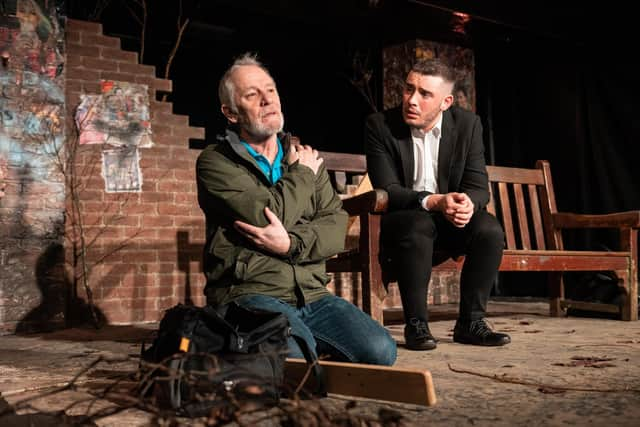Theatre reviews: Until It's Gone | Death Drop – Back in the Habit
Until It’s Gone, Oran Mor, Glasgow ****
Death Drop – Back In The Habit, King’s Theatre, Glasgow **
A grey February lunchtime in Byres Road; but the 19-show Play, Pie And Pint spring season kicks off in fine and warming style, as a capacity audience gathers to watch Alison Carr’s new two-handed drama Until It’s Gone, co-produced with Scotland’s woman-led theatre company Stellar Quines.


In form, the show is a conventional and perfectly-structured park-bench play, featuring two male characters; but its theme touches on the fraught recent debate about gender and sex, imagining a world from which, a generation ago, all the women have suddenly vanished, leaving a dying population of men to wonder what went wrong. The government, meanwhile, is trying to help by compelling lonely and despairing men to meet up and befriend one another; and so it is that a young man of 25, and a lonely and disappointed man of 60, meet on a bench in a Glasgow park, and try to work their way towards some kind of connection, despite a profound and sometimes angry scepticism on both sides.
Advertisement
Hide AdIt’s an apocalyptic situation, aching with grief and loss. Yet Carr’s 55-minute play is also full of humour and humanity, and wry insights into how humankind – or even just half of it – might cope with such a terminal catastrophe. The writing is understated, measured and beautiful; and in Sean Connor as the younger man, and Billy Mack as the older, Caitlin Skinner’s fine production finds two actors who fully understand the depth of emotion beneath the play’s gruff and simple surface, and who unleash it perfectly, little by little, as the conversation deepens into something that might, after all, open up the possibility of some human love and intimacy, before the end.
Tuckshop and Trafalgar Theatre Productions’ drag queen romp Death Drop - Back In The Habit, playing at the King’s Glasgow this week, also touches on contested areas of the current gender debate, although it probably wishes it did not. Ever since the launch of Rocky Horror Show, 50 years ago this summer, there has been a huge market in the UK and elsewhere for shows – some brilliant, some much less so – that combine raunchy gender-bending fun with sharp cultural commentary; and the ugly closing-down of attitudes to drag and queer culture that we are witnessing now makes it all the more important to celebrate the whole no-holds barred genre, while we can.
So in that light, let’s speak generously of this latest Death Drop show, featuring stars of Ru Paul’s Drag Race, and other top UK drag queens. The show is a ludicrous horror-film spoof, scripted by Rob Evans, about a haunted convent full of lavishly libidinous nuns, and the ill-fated priest – played by Drag Idol UK winner Louis Cyfer – who is sent to sort them out; and the echoes of The Sound Of Music come as thick and fast as the horror movie tropes and lewd double-entendres, as Drag Race star Jujubee – playing Sister Maria Julie Andrews – flits around trying to satisfy her teenage libido, and Victoria Scone’s impressive Mother Superior gradually finds her three remaining nuns overtaken by satanic forces.
The whole piece is basically a short send-up sketch painfully over-extended at more than two hours, and the ratio of pure potty-mouthed naughtiness to actual wit is pretty high. In the end, though, it emerges as a broadly good-hearted piece of nonsense for those who love drag and horror; and one that keeps its audience happy and shrieking for a couple of hours, without ever scaling, or claiming to scale, any great creative heights.
Until It’s Gone is at Oran Mor, Glasgow, until 25 February, and the Traverse Theatre, Edinburgh, from 28 February until 4 March. Death Drop – Back In The Habit is at the King’s Theatre, Glasgow, until 25 February.